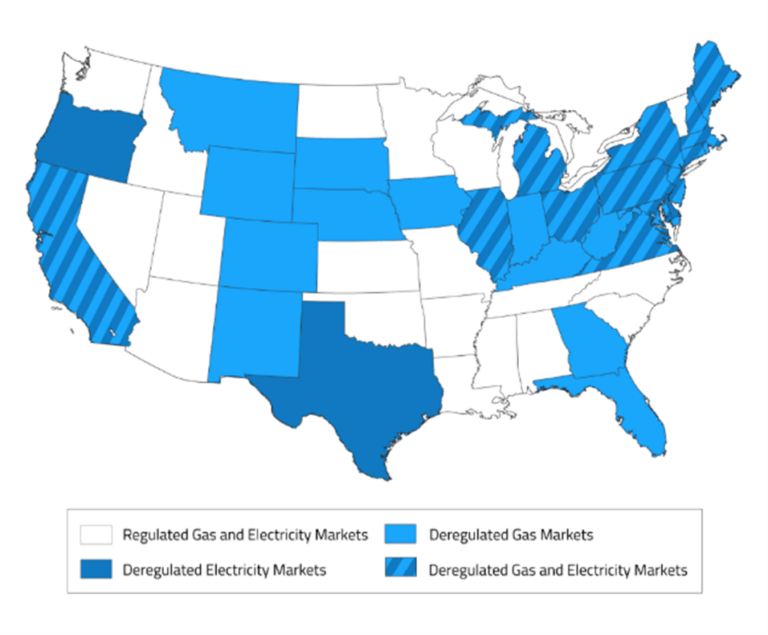
For businesses seeking more control over their energy costs, operating in a deregulated energy market can unlock a range of benefits. At Renodis, we help clients maximize their savings by leveraging deregulated markets where competition among energy suppliers allows for more favorable pricing and contract terms. But what exactly does “deregulated” mean and which states offer this opportunity in 2025?
What is Energy Deregulation?
Energy deregulation refers to the restructuring of utility markets to allow multiple suppliers to compete for consumers’ electricity or natural gas business. In regulated markets, a single utility provides generation, transmission, and distribution services. In contrast, deregulated markets separate these services, enabling third-party suppliers to sell energy while the local utility remains responsible for delivery and infrastructure.
This shift gives consumers, especially businesses with high energy demands, the ability to shop around for competitive rates, renewable energy options, and flexible contract terms.
Deregulated States 101:
Electricity Deregulation
States that offer electricity deregulation typically allow customers to choose an energy service company (ESCO) to supply their electricity, while the utility continues to deliver power and maintain lines.
Natural Gas Deregulation
Similarly, in natural gas deregulation, consumers can choose a gas supplier while the utility manages the physical delivery of gas through its pipeline infrastructure.
Why It Matters for Energy Brokers
For energy brokers, deregulated markets present a valuable opportunity to negotiate better pricing and terms on behalf of clients. It also opens the door to value-added services like demand response programs, energy efficiency consulting, and renewable energy sourcing.
Working With Brokers for Energy Procurement
In deregulated energy markets, energy brokers often require exclusivity agreements to effectively procure electric and gas services for their clients. This is because energy suppliers typically work with only one broker per customer account to provide pricing and manage the procurement process. Without exclusivity, multiple brokers may request quotes for the same client, creating confusion, duplicate submissions, and potential pricing inconsistencies. To maintain clarity, efficiency, and trust in the bidding process, suppliers enforce a “first broker in” policy, honoring only the initial broker to submit a pricing request. As a result, brokers must secure exclusive representation agreements with their clients to ensure they can access supplier pricing and present competitive energy solutions.
Deregulated States for Electricity and/or Natural Gas (as of 2025)
Here is a breakdown of the U.S. states that offer deregulated energy markets for electricity, natural gas, or both:
Electricity Deregulated States
- Connecticut
- Delaware
- Illinois
- Maine
- Maryland
- Massachusetts
- Michigan (limited deregulation)
- New Hampshire
- New Jersey
- New York
- Ohio
- Pennsylvania
- Rhode Island
- Texas (most competitive and fully deregulated market)
- Washington D.C.
Natural Gas Deregulated States
- California
- Georgia
- Illinois
- Indiana
- Iowa
- Kentucky
- Maryland
- Massachusetts
- Michigan
- Nebraska
- New Jersey
- New York
- Ohio
- Pennsylvania
- South Dakota
- Virginia
- West Virginia
- Wyoming
Note: Some states allow certain customer classes (e.g., commercial/industrial) to participate in deregulated markets.
How Renodis Helps in Deregulated States
Navigating deregulated energy markets can be complex, but that’s where Renodis delivers value. With deep market knowledge and industry relationships, we audit usage patterns, evaluate supplier offers, and help businesses secure the most cost-effective energy solutions available.
Whether you are in a fully deregulated state like Texas or operate across multiple markets, our team ensures you make data-driven, strategic energy decisions without the administrative burden.
Ready to Explore Your Options?
If you are doing business in a deregulated state and have not yet optimized your energy contracts, you may be leaving savings on the table. Contact Renodis today to find out how our expert team can help. info@renodis.com





